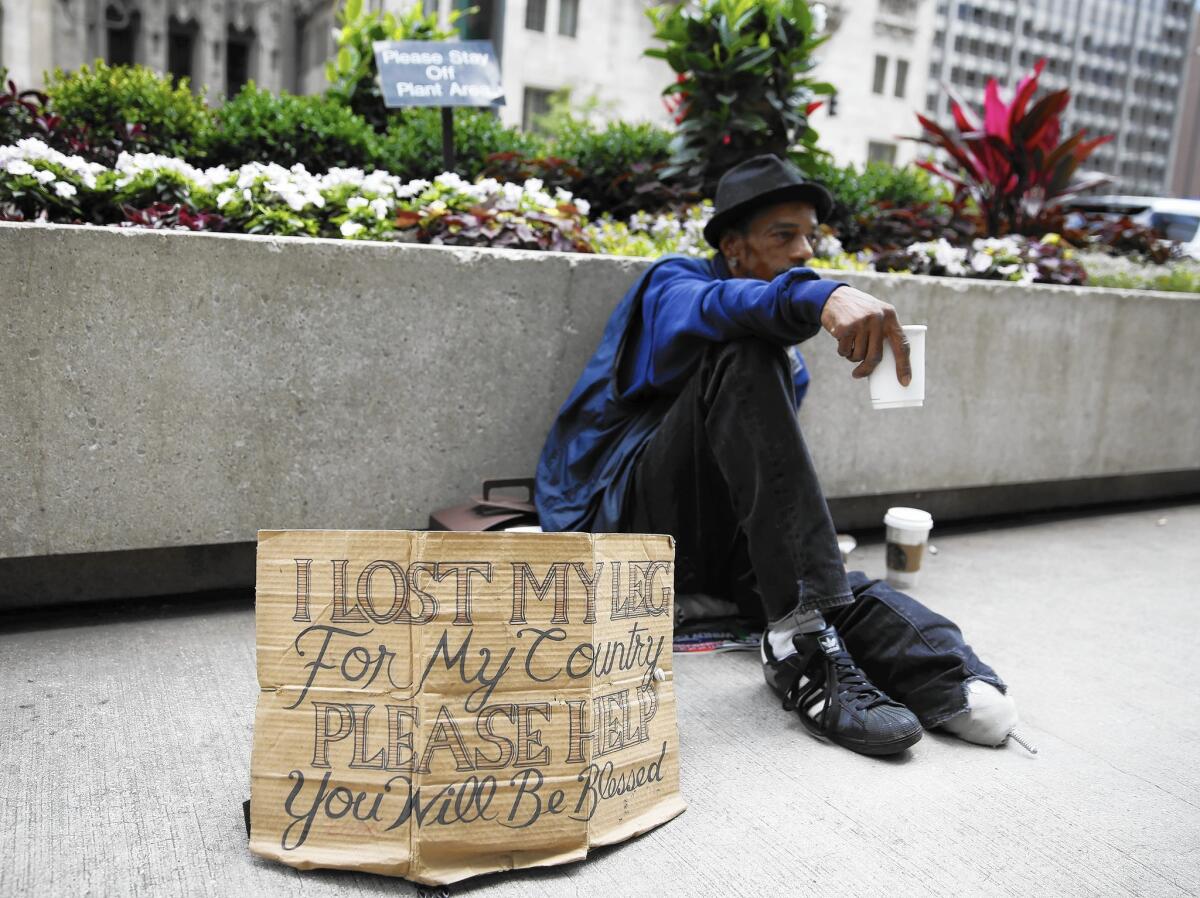Service members discharged for misconduct have much higher rates of homelessness, study says

A homeless veteran in downtown Chicago in July.
- Share via
Veterans whose behavior got them kicked out of the military have dramatically higher rates of homelessness than those who left under normal circumstances, according to a new study by researchers from the Department of Veterans Affairs.
Among VA patients who served in Iraq or Afghanistan between 2001 and 2011, 5.6% were discharged for misconduct. Yet these patients accounted for 28.1% of veterans who had been homeless within their first year out of the military, the analysis found.
The type of misconduct that resulted in discharge typically involved drug or alcohol use.
“This is one of the strongest — if not the strongest — risk factors for homelessness observed to date,” said Jamison Fargo, a research scientist with the VA’s National Center on Homelessness Among Veterans and co-leader of the study, published Tuesday in the Journal of the American Medical Assn.
The analysis did not include former service members whose offenses were so egregious that they were disqualified from using the VA. More than 142,000 service members have been dismissed from the military since 2001 with discharges that usually make them ineligible for VA services, according to data from the Department of Defense.
If the full population of service members discharged for misconduct had been included, the homeless tally would have been higher, said Bradford Adams, a lawyer for Swords to Plowshares, a veterans service group in San Francisco that has been pushing for more support for veterans with “bad discharges.” About 15% of the veterans in its short-term shelters are ineligible for VA services, he said.
The new study “feels like a canary in a coal mine,” he said.
Fargo and his colleagues based their study on the 448,290 VA patients who served in the recent wars. They used Defense Department codes to separate them into five discharge categories and VA records to see who had experienced homelessness. The researchers could not track the roughly 40% of recent war veterans who choose not to use the VA.
Overall, 1% of the VA patients had been homeless at some point within a year of leaving the military. But that figure was 5.4% for those discharged for misconduct.
Using a statistical model that adjusted for race, age, education and other demographic factors, the researchers calculated that veterans forced to leave the military were nearly seven times more likely to be homeless than those with discharges they classified as normal.
The analysis also found the homelessness rates were higher among young, minority and female veterans and those with less education. It did not find a clear link with combat exposure, said Fargo, who also directs the Homelessness Research and Prevention Group at Utah State University.
The researchers did not have access to detailed service, health, disability and court records that could have helped them explain the powerful link between military misconduct and homelessness. Information about which veterans were diagnosed with post-traumatic stress disorder or other psychological problems, as well as their criminal histories after military service, would have been especially useful, he said.
It’s not clear how the findings relate to the older veterans who make up a sizable portion of the homeless population. They left the military at a time when mental health problems went largely untreated, and so they may face more chronic difficulties than more recent veterans.
The nonprofit National Alliance to End Homelessness estimates that 29 out of every 10,000 veterans are homeless — significantly higher than the general population rate of 20 per 10,000.
The VA had vowed to end veteran homelessness by the end of 2015. Although that’s unlikely, the department says it has made steady progress through initiatives to provide jobs and affordable housing to veterans.
The Department of Housing and Urban Development said that the number of homeless veterans across the country fell from 74,770 in 2010 to 49,933 in 2014. Its estimate is based on an annual census of shelters and a tally of people living on the street.
Twitter: @AlanZarembo







